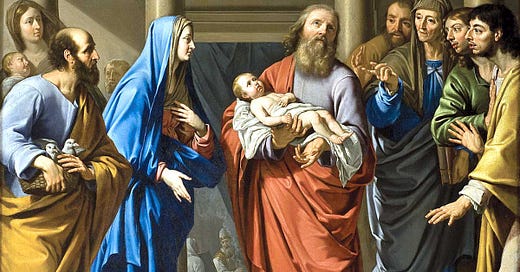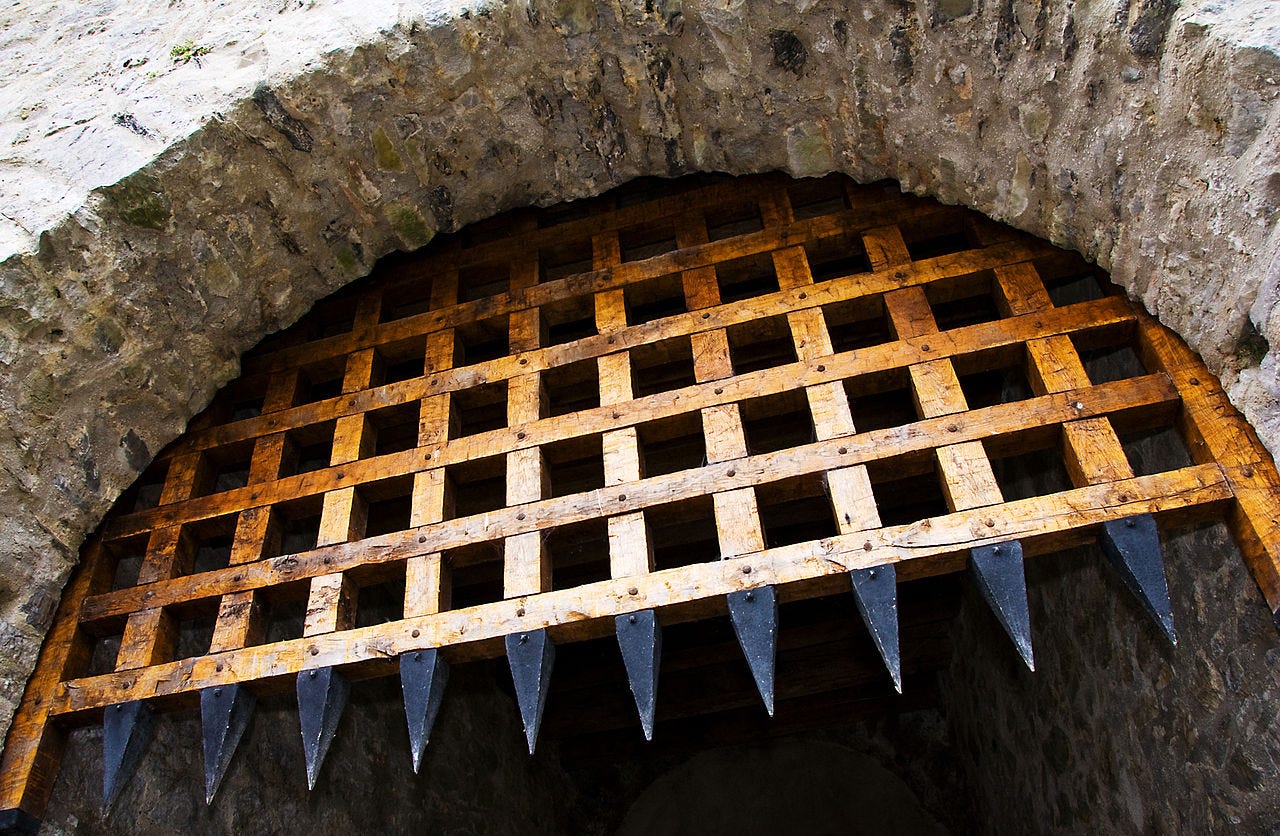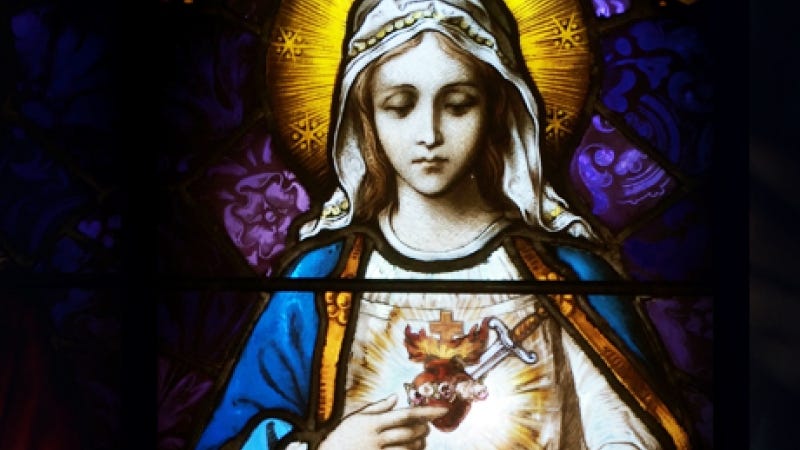In today’s issue of
, writes a wonderful little reflection on the Presentation—I’m not one to engage in uninformed speculation about the hidden life of Christ in the Holy Family, but I do love this feast, and the image of Mary and Joseph presenting their miraculous and divine child in the Temple.
I have to assume that, being mere mortals, even saintly ones, they had no real or clear conception of what, if anything, they were meant to do to prepare Christ for manhood and his mission. But absent any instructions to the contrary, they relied on the simple, humble practice of their faith — including its rituals and traditions — in the expectation that God would meet them there. As He surely did.
For myself, as an admittedly clueless middle-aged father, it’s a comforting encouragement for me. I want to transmit faith to my daughter, and I wish I could do it with a kind of medical efficiency, if only there was a faith booster, or a heresy vaccine.
But having none of these, and being all too aware of my own spiritual poverty, it consoles me to think that when I take her to Mass every week, and present her over and again to the Church to receive the sacraments, I am saying to the Lord that truly she is His child first and entrusting her to Him, just as Mary and Joseph did with their son.
You can read the whole thing here. But don’t forget to come back and read my reflection!
Reading I
Mal 3:1-4
Thus says the Lord GOD: Lo, I am sending my messenger to prepare the way before me; And suddenly there will come to the temple the LORD whom you seek, And the messenger of the covenant whom you desire. Yes, he is coming, says the LORD of hosts.
But who will endure the day of his coming? And who can stand when he appears? For he is like the refiner’s fire, or like the fuller’s lye. He will sit refining and purifying silver, and he will purify the sons of Levi, Refining them like gold or like silver that they may offer due sacrifice to the LORD. Then the sacrifice of Judah and Jerusalem will please the LORD, as in the days of old, as in years gone by.
We tend to think of the fulfillment of prophesies as a good thing, especially the coming of the Messiah. But Malachi reminds us that it’s not going to be all hugs and puppies. As much as anything, Jesus is going to test us, refine us.
Refining isn’t a fun process, for the gold or silver. We’re going to have to go through the fire. But in the end, God will be pleased. We take comfort in knowing that the test isn’t the end.
Responsorial Psalm
24:7, 8, 9, 10
R. Who is this king of glory? It is the Lord!
Lift up, O gates, your lintels;
reach up, you ancient portals,
that the king of glory may come in!
R. Who is this king of glory? It is the Lord!
Who is this king of glory?
The LORD, strong and mighty,
the LORD, mighty in battle.
R. Who is this king of glory? It is the Lord!
Lift up, O gates, your lintels;
reach up, you ancient portals,
that the king of glory may come in!
R. Who is this king of glory? It is the Lord!
Who is this king of glory?
The LORD of hosts; he is the king of glory.
R. Who is this king of glory? It is the Lord!
Portcullises didn’t exist in the ancient world. You know, the thing you probably think of when you read about castle gates—
So when the Psalmist says “Lift up, O gates, your lintels,” he’s not talking about raising the gates; he’s talking about taking them apart. The king is back, we’re not gonna need those anymore. He’s the Prince of Peace, and gates are for protection from enemies at war.
In other words, everything is gonna change when the king comes back.
Reading II
Heb 2:14-18
Since the children share in blood and flesh, Jesus likewise shared in them, that through death he might destroy the one who has the power of death, that is, the Devil, and free those who through fear of death had been subject to slavery all their life. Surely he did not help angels
but rather the descendants of Abraham; therefore, he had to become like his brothers and sisters in every way, that he might be a merciful and faithful high priest before God to expiate the sins of the people. Because he himself was tested through what he suffered, he is able to help those who are being tested.
Some ancient Jews, including the author of Hebrews, were of the belief that God didn’t originally plan for anyone to die. It was introduced into the world by the Devil, which is why he has the power over death (until Jesus came along, that is).
People were afraid that, in Death, they’d be cut off from God.1 Angels, being spirits, were in no such danger. Jesus became a man to save us, his brothers and sisters, and be merciful for those who had gone before.
Alleluia
Lk 2:32
R. Alleluia, alleluia.
A light of revelation to the Gentiles,
and glory for your people Israel.
R. Alleluia, alleluia.
Never think the new testament “cancels out” the old, or something like that. Israel was a part of God’s plan, even if it was just the start of God’s plan.
Gospel
Lk 2:22-40
When the days were completed for their purification according to the law of Moses, Mary and Joseph took Jesus up to Jerusalem to present him to the Lord, just as it is written in the law of the Lord, Every male that opens the womb shall be consecrated to the Lord, and to offer the sacrifice of a pair of turtledoves or two young pigeons, in accordance with the dictate in the law of the Lord.
Now there was a man in Jerusalem whose name was Simeon. This man was righteous and devout, awaiting the consolation of Israel, and the Holy Spirit was upon him. It had been revealed to him by the Holy Spirit that he should not see death before he had seen the Christ of the Lord. He came in the Spirit into the temple; and when the parents brought in the child Jesus to perform the custom of the law in regard to him, he took him into his arms and blessed God, saying:
“Now, Master, you may let your servant go in peace, according to your word, for my eyes have seen your salvation, which you prepared in the sight of all the peoples: a light for revelation to the Gentiles, and glory for your people Israel.”
The child’s father and mother were amazed at what was said about him; and Simeon blessed them and said to Mary his mother, “Behold, this child is destined for the fall and rise of many in Israel, and to be a sign that will be contradicted -and you yourself a sword will pierce- so that the thoughts of many hearts may be revealed.”
There was also a prophetess, Anna, the daughter of Phanuel, of the tribe of Asher. She was advanced in years, having lived seven years with her husband after her marriage, and then as a widow until she was eighty-four. She never left the temple, but worshiped night and day with fasting and prayer. And coming forward at that very time, she gave thanks to God and spoke about the child to all who were awaiting the redemption of Jerusalem.
When they had fulfilled all the prescriptions of the law of the Lord, they returned to Galilee, to their own town of Nazareth. The child grew and became strong, filled with wisdom; and the favor of God was upon him.
We already read this back in the Christmas season, but it’s been 40 days since Christmas, the length of “their purification according to the law of Moses,” so we officially celebrate the presentation today.
We’re also reminded that the Holy Family were poor, in an earthly, monetary sense. A mother is supposed to offer a year-old lamb as a burnt offering and a turtledove or young pigeon; if you couldn’t afford a lamb, you’d bring two turtledoves or pigeons, like Mary did.
So, it was probably an expensive hassle to bring Jesus all the way to the temple in Jerusalem, but they did it anyway. And it’s a good thing, because Simeon was there, waiting his entire long life for the Messiah. After blessing Jesus, he says what’s now known as the Canticle of Simeon (which many people use as part of their nighttime prayers).
Simeon doesn’t just keel over right then and there, with baby Jesus in his arms. He takes the time to announce a prophesy. Jesus will not only be an important figure in Israel (duh), but Mary will be a part of it. As Jesus suffers, so will she; it’ll be like a sword in her heart.
She doesn’t know it yet, but Mary will be at the foot of the cross when Jesus is crucified. Any parent knows what it’s like to see their child suffer, whether it’s a sickness or an injury or an emotional wound. Jesus had all of those, too—He is both God and Man. Mary had to clean up scraped knees and feed Him chicken noodle soup when He was sick.
But she also had to watch Him die, which no parent should have to do. Despite that pain, she endures for us as Queen of Heaven. When you pray for Mary’s intercession, remember she suffers as much for you, who are her adopted, spiritual child, as for her own Son.
This reading is ever so slightly longer than the one we got in Advent, now including the story of the prophetess Anna. Not much is known about her, besides these three verses, but tradition tells us she also taught Mary about prayer and devotion when she was a girl.
We all know the little old ladies at church, who seem to always be around, helping take care of things and being friendly with everyone. The parish couldn’t run without them, and they rarely get thanked or even noticed. Anna seems to be like that, in the extreme, never even leaving the temple. Once she met Jesus, she became one of His first prophets. She told everyone about Him, even before He had actually done anything.
So, next time you go to mass and see an usher or sacristan getting everything set so you and everyone else can focus on the holy sacrifice itself, take a second to thank them. Maybe even say an extra prayer to St. Anna to bless them.






Excellent.